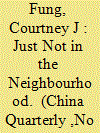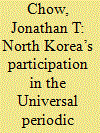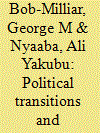| Srl | Item |
| 1 |
ID:
179293


|
|
|
|
|
| Summary/Abstract |
Much has been written about China's active engagement and progressive approach to the “responsibility to protect,” a norm that reframes state sovereignty not as a right but as a responsibility. China's response to the “Report of the UN Commission of Inquiry on human rights in the Democratic People's Republic of Korea (DPRK),” which invokes the norm, however, challenges existing literature. China flatly refuses to uphold the responsibility to protect in the case of the DPRK, despite using previously supported standards to invoke the norm elsewhere and the report's dozens of consensual recommendations. This article is the first to systematically investigate how China has responded to the report. It shows that China's responses are shaped by its exceptionalism and concerns that the responsibility to protect could lead to regime change. I conclude with implications for the broader question of China's engagement with international norms in its near abroad. In my discussion, I draw on interviews with Korean and Chinese foreign policy elites, UN and US officials and DPRK human rights advocates, as well as primary and secondary documents.
|
|
|
|
|
|
|
|
|
|
|
|
|
|
|
|
| 2 |
ID:
151997


|
|
|
|
|
| Summary/Abstract |
North Korea’s participation in the UNHRC’s Universal Periodic Review (UPR)—a peer review in which states make recommendations to one another for improving human rights implementation—is a notable exception to its rejection of other human rights mechanisms. What explains North Korea’s willing participation in the UPR? This essay analyses North Korea’s participation in the first (2008–11) and second (2012–15) UPR cycles through its written submissions, responses to recommendations, and recommendations to other states. It finds that North Korea has consistently accepted weak recommendations, rejected more specific policy changes, and implemented accepted recommendations on a limited basis, allowing it to claim compliance with human rights at minimal cost. The UPR’s reliance on states’ self-reports and its inability to adjudicate competing factual claims allow North Korea to reject claims of egregious abuses, openly advocate for a radically state-centric vision of human rights, and challenge the legitimacy of human rights mechanisms like the Commission of Inquiry and Special Rapporteur while building support from other states with similar views. Notably, the Commission of Inquiry appears to have motivated North Korea to increase its cooperation with the UPR, demonstrating that the UPR complements but cannot replace other UN human rights mechanisms.
|
|
|
|
|
|
|
|
|
|
|
|
|
|
|
|
| 3 |
ID:
174564


|
|
|
|
|
| Summary/Abstract |
What role does a commission of inquiry (COI) play in delivering accountability? In theory, when the public delegates power to political leaders to formulate and implement policies, they seek political accountability in return. Using Ghana as a case study, this study examines how the operations of COIs may deliver accountability. Principal–agent theories of accountability and African conceptions of legitimacy are incomplete on their own and need to be integrated into an explanation of political accountability that takes into consideration political transitions and the role of COIs in delivering a minimalist form of accountability. This study argues that a COI is an instrument of regime legitimatisation. The demands by citizens for political accountability in Ghana correlate with political transitions. Accompanying each power alternation was a different model of political accountability. To understand the predominant applications of accountability, we emphasise the politicisation of accountability.
|
|
|
|
|
|
|
|
|
|
|
|
|
|
|
|